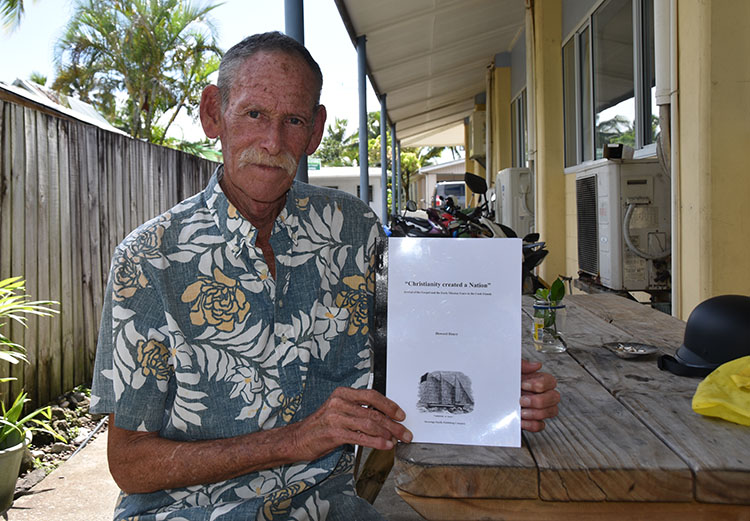Spreading the Gospel of history
Thursday 4 May 2023 | Written by Matthew Littlewood | Published in Local, National

Author Howard Henry with a copy of his book ‘Christianity created a Nation’. 21082021
Historian Howard Henry has been fascinated by the birth of Christianity in the Cook Islands for many years. He talks to Cook Islands News journalist Matthew Littlewood about his upcoming series of articles in this newspaper, and his love of the research process.
Henry loves getting into the details. The local historian has authored 14 books about the Cook Islands’ history. He is currently immersing himself in the history of Christianity and its arrival to various islands in the group which each celebrates their 200th anniversary in July of this year.
“Prior to the arrival of Christianity, the religions makeup of our various islands had many traditional gods who were worshiped for different things,” Henry says.
“So, when people realised there was this European God, and saw what sort of material wealth this European God was able to provide, it didn’t take long for many people to work out that this God was indeed very powerful, very wealthy and also extremely generous to those who were part of the Christian faith.”
Read more:
- ‘You’ve been worshipping nothing but pieces of wood’
- Letter: Living under God’s blessing
- ‘Let us worship but one (true) God’
- Death of Ariki’s daughter, an attempt to introduce Christianity to Mangaia
- ‘The Spirit of God is forever present … everywhere – all the time’
- Seeds of Christianity: The Gospel Pioneer to Aitutaki
- ‘They called this island Wytootakee’
- Christianity created a Nation: The arrival of the Gospel
Henry says the early missionaries were keen to stress that God was a loving God, where all believers lived in peace with each other.
“It was quite a big difference to what had been on some islands prior to the arrival of the Gospel and Christianity."
“It meant that even those who didn’t convert to Christianity certainly weren’t against the religion, simply because they saw what these Europeans had at their disposal.”
Henry says the writings of John Williams, from the London Missionary Society, who led the spread of Christianity across much of the South Pacific from 1817 to the late 1830s, were an invaluable source of information.
“He documented a lot of the early growth of Christianity on many of these South Pacific islands,” he says.
“John Williams wrote about taking the Gospel to Aitutaki in 1821. He then wrote about taking the Gospel to Mangaia, Atiu, Mitiaro, Mauke and Rarotonga in July 1823. So the writings of John Williams are indeed a very valuable resource.”
Henry says a number of things surprised him a little in his research.
“One thing that surprised me was how some people embraced Christianity so quickly without really knowing why,” he says.
“The other thing that surprised me was the way it was rejected by others. It wasn’t done through violence, but rather there were some people who were more than satisfied with their traditional gods and so had no desire to change their religious allegiance.”
Henry says Christianity really became firmly established on many islands after Aaron Buzacott established the Takamoa Theological College in 1843.
“Only the brightest and most dedicated young men were accepted for Theological training at Takamoa.” he says.
“It was four years’ training to become a Native Teacher. Not only were these men being trained in Christian matters, they were also being taught a wide range of activities as well. Equally their wives were also getting just as much intensive training: they were being taught home skills, like sewing clothes, health matters, hygiene and a whole raft of other domestic and community activities.
“This meant that when a husband and wife team went out to spread the Gospel at various Mission Stations, they weren’t just taking religion, they were taking a whole new way of life with them as well. The wives were therefore very important in taking Christianity to a large number of people as a result. I think sometimes their contributions were undervalued.”
Henry says the “very structured” society on the various islands actually made it easier for Christianity to become firmly established.
“A lot of those who embraced the Gospel didn’t initially understand it, but they soon learned. This was a time when people went to church every day,” he says.
“There was always something happening in the church. People were attached and connected to it basically 24-7.”
Henry says it did not take long before “Native Teachers” from the Takamoa Theological College, were dispersed by the London Missionary Society, right across much of the South Pacific as far as Papua New Guinea.
“At least 100 of them went overseas to spread the word. Some of them came back, but the vast majority didn’t, and they were spread far and wide,” he says.
Henry says he’s enjoyed the research process, even though there are hurdles.
“A lot of the information is comprehensive, but there are also gaps, so it’s like putting together a jigsaw puzzle. There are so many interesting aspects to our Christian history. There are some very happy stories, some very sad ones, and all sorts of stories in between,” he says.
- Howard Henry’s series of articles on the arrival of Christianity in the Cook Islands debuts this Saturday in the Cook Islands News.

















































